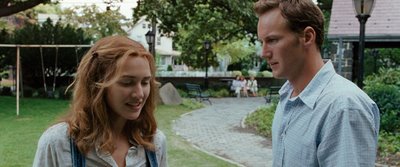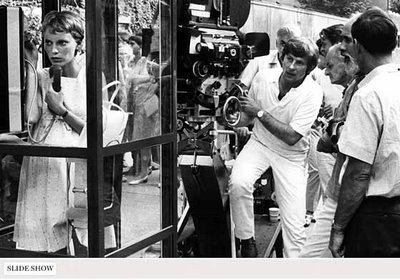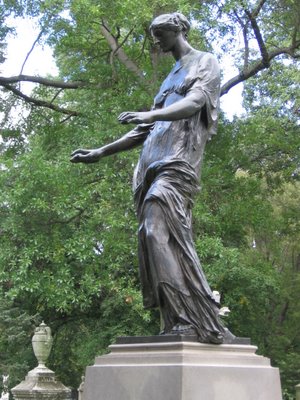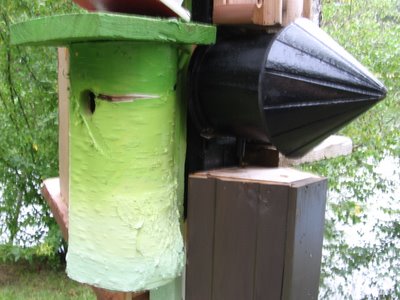
Alexander Payne’s sharp, wickedly funny adaptation of Tom Perrotta’s novel ELECTION remains one of the best-ever book-into-film conversions. A long-belated follow-up to his great directorial debut IN THE BEDROOM, Todd Field’s adaptation of another Perrotta novel doesn’t scale the same heights, but it’s solid and far from a disappointment.
Superficially, LITTLE CHILDREN is another malaise-in-suburbia critique. Both Sarah (Kate Winslet) and Brad (Patrick Wilson) are thirtysomethings who have young children, are in mismatched marriages, and aren’t entirely sure how they ended up there. Sarah has a Master’s in English but is now merely a housewife who can’t relate to the other, clone-like mothers at the neighborhood playground (or Richard, her older husband who has issues of his own). Brad is a stay-at-home dad and ex-law student half-heartedly trying to pass the bar exam after failing it twice. He gets little attention or genuine support from his wife Kathy (Jennifer Connelly), a career-preoccupied documentary filmmaker.
Following a series of playmates with their two children, Sarah and Brad fall deep into an impulsive, passionate affair and discover a connection that vindicates something lacking in their lives. However, what elevates the film beyond such well-tread territory is a near-total dearth of melodrama or Hollywood hokum. Perrotta co-wrote the screenplay with Field, and it retains the author’s understated satiric prose with subtlety and directness. Slightly frumpy but still beautiful, Winslet’s good, but Wilson is the standout—he’s exceptionally well-attuned to nuances and contradictions of his character. Dubbed “The Prom King” by the adoring neighborhood moms, Brad is the hunky ex-jock within grasp of an ideal, fulfilling life, but he doesn’t have the drive or self-confidence to go forward. Instead, he desires only to look back for approval from substitutes for the boys clubs of his youth (including a police football team he’s drafted into and a ragtag group of skateboarding teens).
Intertwined within all of this is a secondary narrative about Ronald (Jackie Earle Haley), a middle-aged man who has just served a prison term for exposing himself to a child. He is sent home to live with his aging mother in Brad and Sarah’s neighborhood; fear and disgust surface when he returns. This paranoia is most eloquently expressed about forty minutes into the film when he unexpectedly makes his first appearance onscreen that isn’t one of his mugshots plastered all over town. It’s one thing to witness the community’s collective revulsion (orchestrated in a scene worthy of Hitchcock); it’s another to see just how alarmingly aged and emaciated Haley looks thirty years after his BAD NEWS BEARS heyday. Fortunately, his presence goes beyond stunt casting and he gives a chilling, touching performance.
As in the novel, this is where the film becomes slightly problematic—the two storylines don’t always comfortably coalesce. Both Sarah and Brad develop somewhat tenuous links to the second narrative, and Ronald seems to be in this film just to say something about Sarah’s nature. LITTLE CHILDREN doesn’t arrive at an entirely convincing conclusion; it’s more like a head-on collision of comic and tragic outcomes. But Field and Perrotta at least treat all of their flawed characters with compassion—that very quality lifts this smart, intense film above the rest of its ilk.
(4 stars)**********

Had I seen MARIE ANTOINETTE ten years ago, I would have walked out the theater flushed and excited, declaring it my favorite of the year. Now, I know a little better to lavish such praise on what is an interesting experiment, but nothing more. Of course, Sofia Coppola already made her masterpiece with
LOST IN TRANSLATION (and THE VIRGIN SUICIDES comes close). Her unconventional biopic isn’t a complete failure; I’m not sure if it even knows what it wants to be.
The most thrilling parts involve music. I’ve always adored anachronisms in period pieces (it’s what keeps most of ‘em from being stodgy), and the moods Coppola conjures up here are exquisite, even transcendent, especially the parts scored to “Hong Kong Garden” or any of the three songs by previously unknown dream-poppers The Radio Dept. You couldn’t ask for a better Marie than Kirsten Dunst, who has managed to retain her luminous child-like qualities without seeming childish. Also, get a load of that great supporting ensemble: Steve Coogan, Shirley Henderson, Rip Torn, Judy Davis, forever gravelly-voiced Marianne Faithful (as Marie’s mum!) and Asia Argento in an head-turning turn as Madame du Barry.
The film is more concerned with fabulous décor and the pressure on Marie to give birth to an heir (no thanks to wet blanket Louis XVI, played an appropriately aloof Jason Schwartzman), than the impending French Revolution, which barely figures in here. Coppola has made an opulent, swooning spectacle that’s highly distinctive, daring, loads of fun, but lacking much of the weight of her first two features. And in the end, it’s not radical
enough; although something close to a train wreck in parts, MOULIN ROGUE already did this sort of thing with much more feeling.
(3 stars)








